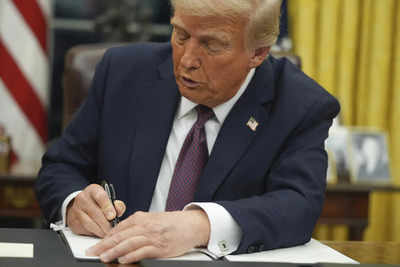- News
- Education News
- News
- Birthright citizenship ban is doubly unlawful: Harvard law professor
Trending
Birthright citizenship ban is doubly unlawful: Harvard law professor
Donald Trump’s executive order aims to end birthright citizenship for children born in the US to parents on temporary visas, scheduled to take effect in February 2025. Legal experts deem the order unconstitutional, emphasizing that birthright citizenship is guaranteed by the Fourteenth Amendment and established statutes.
US Birthright Citizenship Ban: Donald Trump’s controversial executive order ending birthright citizenship has thrown immigrant communities into turmoil. For Indian families in particular, the move could be devastating. With the policy set to take effect on February 19, 2025, children born in the US to parents on temporary visas—such as H-1Bs, H-4s, or student visas—will no longer be granted automatic US citizenship.
This marks a seismic shift for families already navigating the labyrinthine US immigration system. Indians, who hold the majority of H-1B visas, are now watching their children face a precarious future: barred from accessing in-state tuition, federal financial aid, and the stability that comes with American citizenship. But can a sitting president legally alter such a fundamental right? Legal experts say no.
What is birthright citizenship?
At the heart of the debate lies the Fourteenth Amendment, which states: "All persons born or naturalized in the United States, and subject to the jurisdiction thereof, are citizens of the United States."
By trying to do this by executive order, it’s a violation of citizenship statutes as well — not just the Constitution. It’s doubly unlawful.
Harvard Law School Professor Gerald Neuman
This principle, known as jus soli or "right of the soil," ensures that anyone born on US soil is automatically a citizen, regardless of their parents’ immigration status. The provision was designed to eliminate a “hereditary caste” of non-citizens, granting equal rights to all born within US borders.
It was solidified in the landmark Wong Kim Ark case (1898), where the Supreme Court affirmed that the Fourteenth Amendment guarantees citizenship to anyone born on US soil, barring narrow exceptions like children of diplomats or foreign military personnel.
Harvard Law Professor calls the order ‘doubly unlawful’
“Both history and Supreme Court precedent confirm that birthright citizenship applies to anyone born in the US—regardless of their parents’ legal status,” Professor Neuman asserts. Furthermore, he describes the executive order as “doubly unlawful,” violating not only the Constitution but also citizenship statutes.
The legal argument: Can the Fourteenth Amendment be redefined?
Trump’s administration contends that the Fourteenth Amendment does not extend citizenship to children of undocumented immigrants or temporary visa holders. However, Professor Neuman dismisses this argument as a “crazy theory or dishonest interpretation” of the Constitution.
He points to historical debates from the 1860s that clearly outlined limited exceptions—such as children of foreign diplomats or those born on foreign warships. These exceptions hinge on individuals not being under US jurisdiction, which does not apply to undocumented immigrants or visa holders. As Professor Neuman emphasizes, undocumented individuals are subject to US laws, making their children eligible for birthright citizenship under the Fourteenth Amendment.
Executive power vs constitutional limits
The crux of the issue lies in whether the president can unilaterally alter birthright citizenship. According to Professor Neuman, the answer is an unequivocal: No.
“The president has no authority to change citizenship rules. Only Congress can legislate on this matter, and even Congress cannot reduce citizenship rights below the constitutional minimum,” he explains.
By attempting to bypass Congress, the executive order not only violates the Constitution but also existing citizenship laws. Legal challenges are already underway, with federal judges temporarily blocking the order. Courts may either rely on constitutional principles or interpret citizenship statutes to strike down the policy.
What’s at stake for immigrant families?
For Indian families, the implications of this order are profound. The H-1B visa program, dominated by Indian nationals, already subjects them to decades-long green card backlogs. The ban on birthright citizenship exacerbates their struggles, leaving their US-born children in legal limbo. These children may lose access to educational benefits like in-state tuition and federal aid, and they may face difficulties navigating immigration systems as non-citizens.
Is Birthright Citizenship too broad?
Critics of birthright citizenship often point to birth tourism, where individuals exploit the system by giving birth in the US solely to secure citizenship for their children. While Professor Neuman acknowledges this issue, he argues that it is a minor concern and should not justify denying citizenship to children born in the US “There are ways of addressing birth tourism without penalizing innocent babies,” he says.
What happens next?
Legal experts anticipate a protracted battle in the courts. Professor Neuman predicts that some judges will rely on constitutional arguments, while others may use statutory grounds to invalidate the executive order. Either way, the legal consensus seems to be clear: the order is not likely to stand.
As further judicial processes unfold, the spotlight remains on the enduring power of the Fourteenth Amendment. At its core, this debate is about preserving the constitutional principles that define the United States as a nation. For immigrant families, the stakes have never been higher.
Stay updated with the latest education news on Times of India. Explore the CBSE date sheet for Class 10 and 12 across Arts, Science, and Commerce streams.
End of Article
FOLLOW US ON SOCIAL MEDIA
Visual Stories
Hot Picks
TOP TRENDING
Explore Every Corner
Across The Globe











